Organisational Behaviour: Motivation and Team Dynamics at Sainsbury's
VerifiedAdded on 2023/06/17
|15
|4758
|158
Report
AI Summary
This report provides an analysis of organisational behaviour within Sainsbury's, examining the impact of culture, power, and politics on individual and team performance. It explores various cultural types, forms of power, and the effects of politics in the workplace. The report also delves into content and process theories of motivation, specifically Maslow's hierarchy of needs and Adam's equity theory, and their application within Sainsbury's. Furthermore, it discusses the characteristics of effective and ineffective teams, highlighting team development theories and their relevance to organisational success. Finally, the report addresses key concepts and philosophies of organisational behaviour, offering a comprehensive overview of factors influencing employee behaviour and organisational performance. Desklib provides access to similar solved assignments and study resources for students.
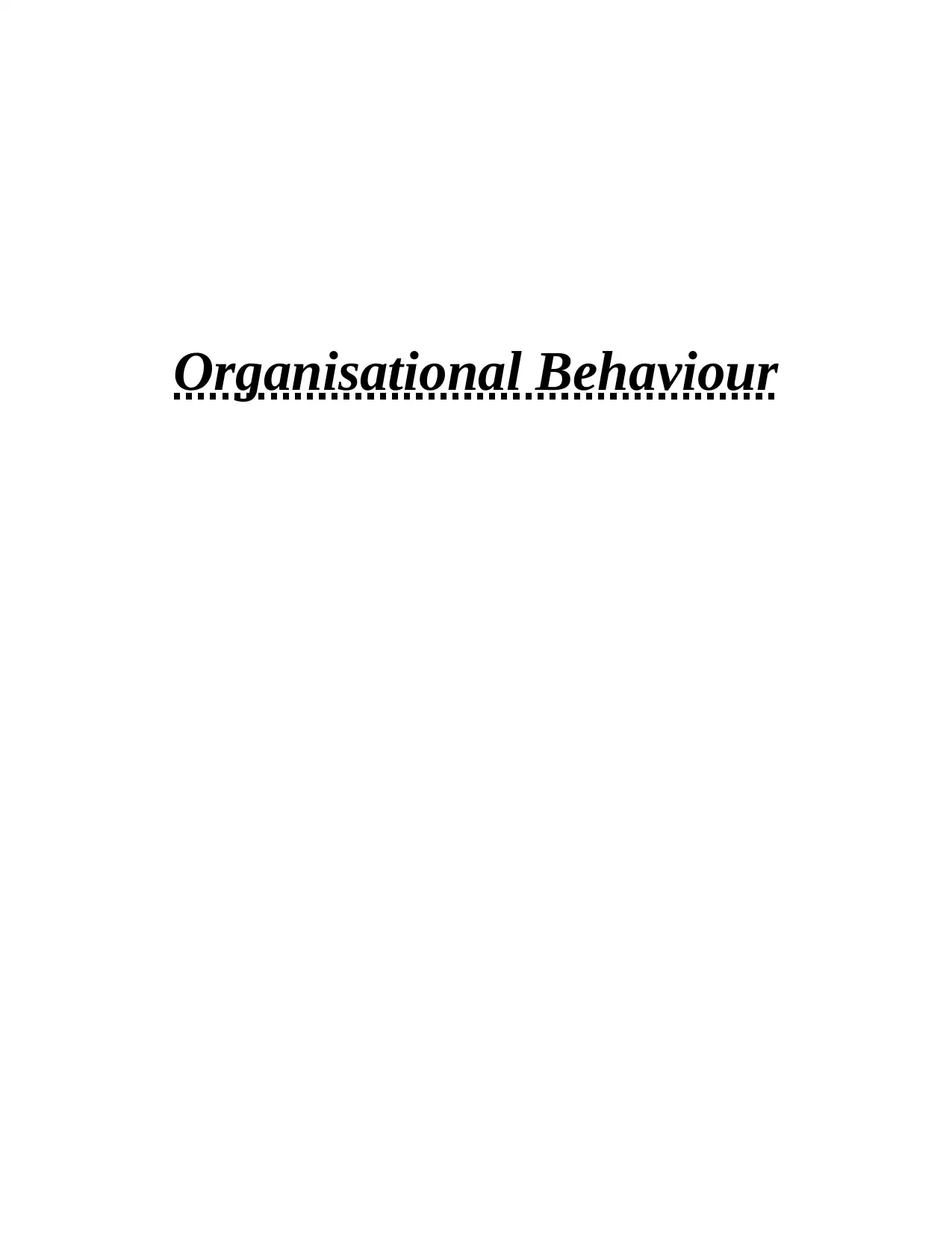
Organisational Behaviour
Paraphrase This Document
Need a fresh take? Get an instant paraphrase of this document with our AI Paraphraser
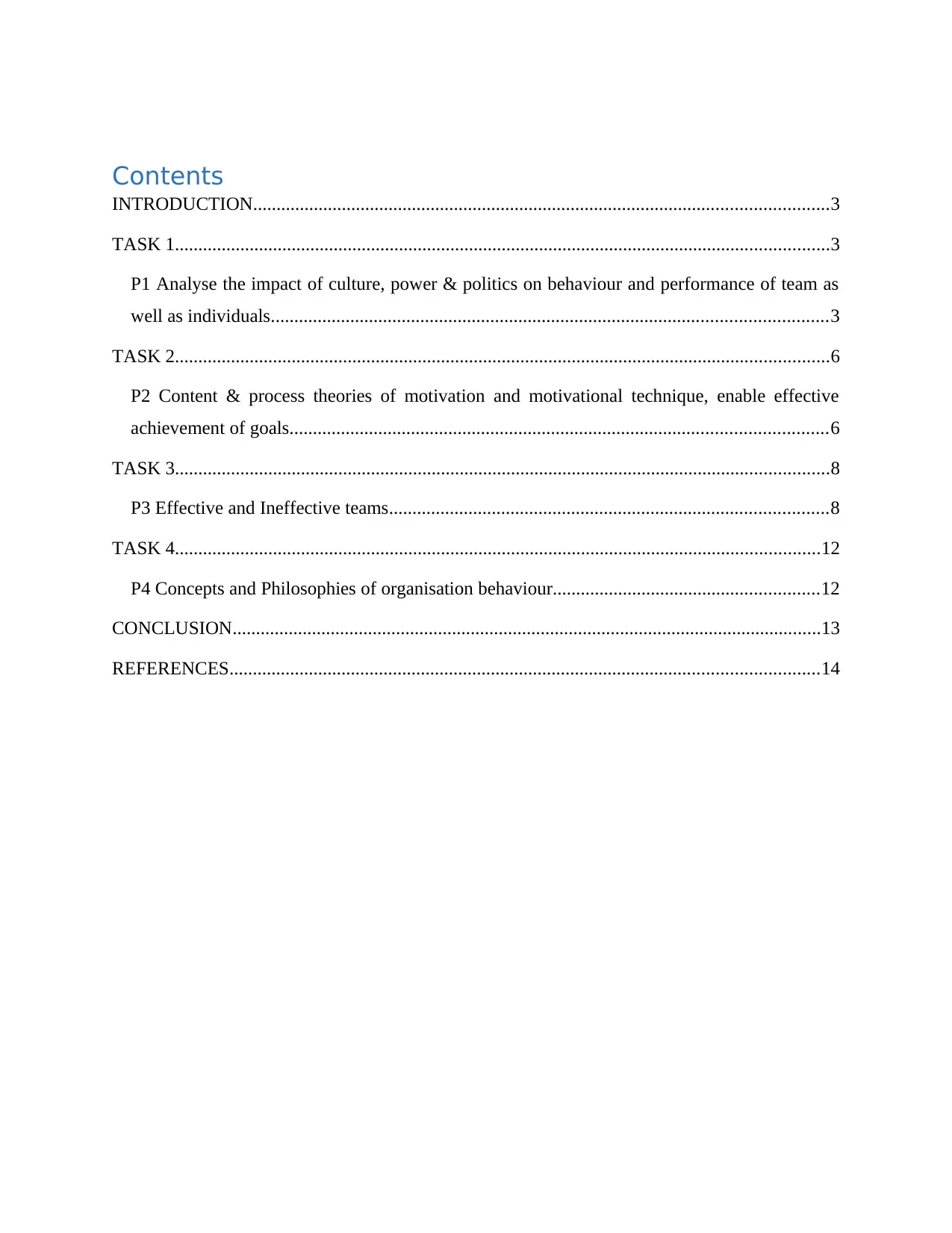
Contents
INTRODUCTION...........................................................................................................................3
TASK 1............................................................................................................................................3
P1 Analyse the impact of culture, power & politics on behaviour and performance of team as
well as individuals.......................................................................................................................3
TASK 2............................................................................................................................................6
P2 Content & process theories of motivation and motivational technique, enable effective
achievement of goals...................................................................................................................6
TASK 3............................................................................................................................................8
P3 Effective and Ineffective teams..............................................................................................8
TASK 4..........................................................................................................................................12
P4 Concepts and Philosophies of organisation behaviour.........................................................12
CONCLUSION..............................................................................................................................13
REFERENCES..............................................................................................................................14
INTRODUCTION...........................................................................................................................3
TASK 1............................................................................................................................................3
P1 Analyse the impact of culture, power & politics on behaviour and performance of team as
well as individuals.......................................................................................................................3
TASK 2............................................................................................................................................6
P2 Content & process theories of motivation and motivational technique, enable effective
achievement of goals...................................................................................................................6
TASK 3............................................................................................................................................8
P3 Effective and Ineffective teams..............................................................................................8
TASK 4..........................................................................................................................................12
P4 Concepts and Philosophies of organisation behaviour.........................................................12
CONCLUSION..............................................................................................................................13
REFERENCES..............................................................................................................................14
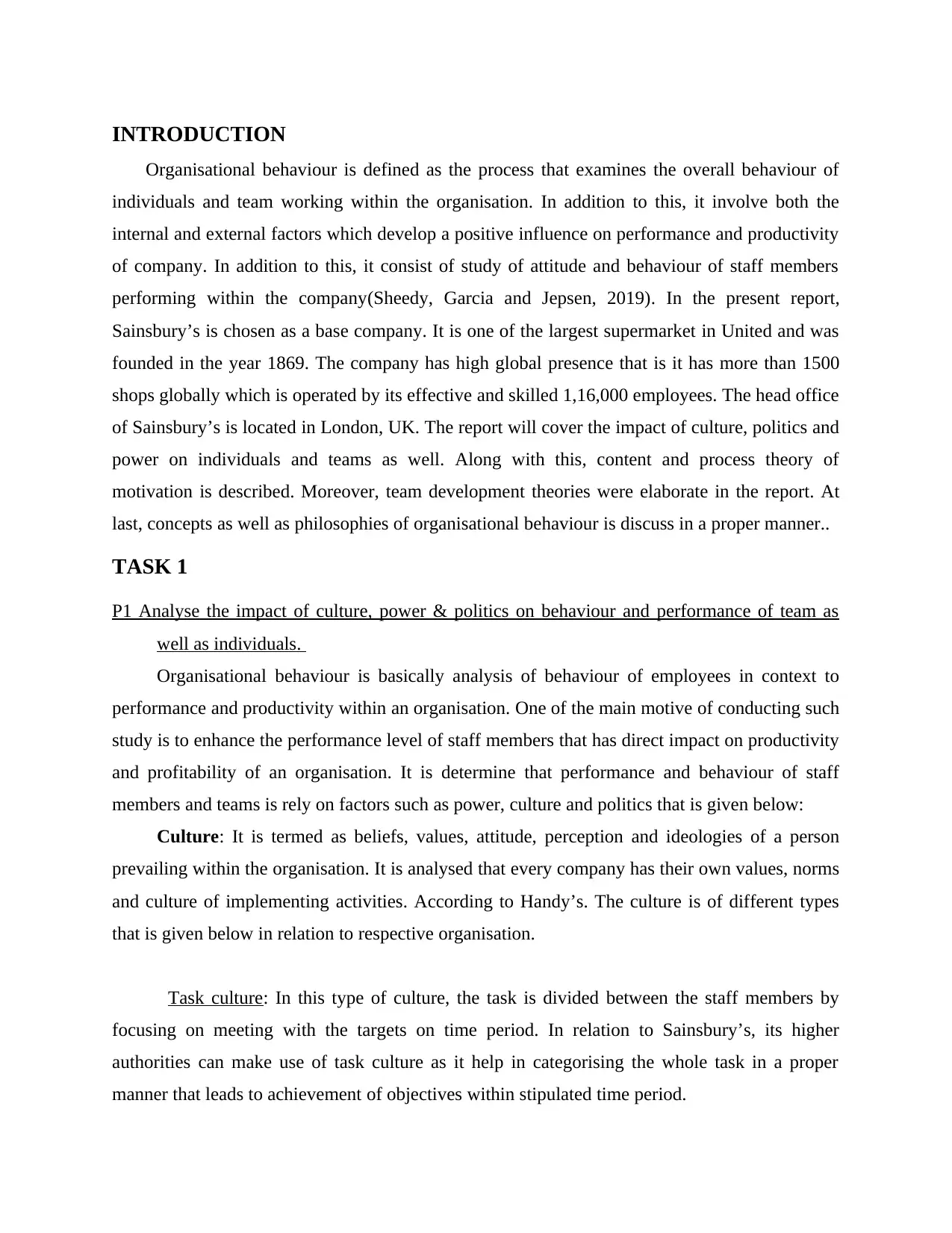
INTRODUCTION
Organisational behaviour is defined as the process that examines the overall behaviour of
individuals and team working within the organisation. In addition to this, it involve both the
internal and external factors which develop a positive influence on performance and productivity
of company. In addition to this, it consist of study of attitude and behaviour of staff members
performing within the company(Sheedy, Garcia and Jepsen, 2019). In the present report,
Sainsbury’s is chosen as a base company. It is one of the largest supermarket in United and was
founded in the year 1869. The company has high global presence that is it has more than 1500
shops globally which is operated by its effective and skilled 1,16,000 employees. The head office
of Sainsbury’s is located in London, UK. The report will cover the impact of culture, politics and
power on individuals and teams as well. Along with this, content and process theory of
motivation is described. Moreover, team development theories were elaborate in the report. At
last, concepts as well as philosophies of organisational behaviour is discuss in a proper manner..
TASK 1
P1 Analyse the impact of culture, power & politics on behaviour and performance of team as
well as individuals.
Organisational behaviour is basically analysis of behaviour of employees in context to
performance and productivity within an organisation. One of the main motive of conducting such
study is to enhance the performance level of staff members that has direct impact on productivity
and profitability of an organisation. It is determine that performance and behaviour of staff
members and teams is rely on factors such as power, culture and politics that is given below:
Culture: It is termed as beliefs, values, attitude, perception and ideologies of a person
prevailing within the organisation. It is analysed that every company has their own values, norms
and culture of implementing activities. According to Handy’s. The culture is of different types
that is given below in relation to respective organisation.
Task culture: In this type of culture, the task is divided between the staff members by
focusing on meeting with the targets on time period. In relation to Sainsbury’s, its higher
authorities can make use of task culture as it help in categorising the whole task in a proper
manner that leads to achievement of objectives within stipulated time period.
Organisational behaviour is defined as the process that examines the overall behaviour of
individuals and team working within the organisation. In addition to this, it involve both the
internal and external factors which develop a positive influence on performance and productivity
of company. In addition to this, it consist of study of attitude and behaviour of staff members
performing within the company(Sheedy, Garcia and Jepsen, 2019). In the present report,
Sainsbury’s is chosen as a base company. It is one of the largest supermarket in United and was
founded in the year 1869. The company has high global presence that is it has more than 1500
shops globally which is operated by its effective and skilled 1,16,000 employees. The head office
of Sainsbury’s is located in London, UK. The report will cover the impact of culture, politics and
power on individuals and teams as well. Along with this, content and process theory of
motivation is described. Moreover, team development theories were elaborate in the report. At
last, concepts as well as philosophies of organisational behaviour is discuss in a proper manner..
TASK 1
P1 Analyse the impact of culture, power & politics on behaviour and performance of team as
well as individuals.
Organisational behaviour is basically analysis of behaviour of employees in context to
performance and productivity within an organisation. One of the main motive of conducting such
study is to enhance the performance level of staff members that has direct impact on productivity
and profitability of an organisation. It is determine that performance and behaviour of staff
members and teams is rely on factors such as power, culture and politics that is given below:
Culture: It is termed as beliefs, values, attitude, perception and ideologies of a person
prevailing within the organisation. It is analysed that every company has their own values, norms
and culture of implementing activities. According to Handy’s. The culture is of different types
that is given below in relation to respective organisation.
Task culture: In this type of culture, the task is divided between the staff members by
focusing on meeting with the targets on time period. In relation to Sainsbury’s, its higher
authorities can make use of task culture as it help in categorising the whole task in a proper
manner that leads to achievement of objectives within stipulated time period.
⊘ This is a preview!⊘
Do you want full access?
Subscribe today to unlock all pages.

Trusted by 1+ million students worldwide
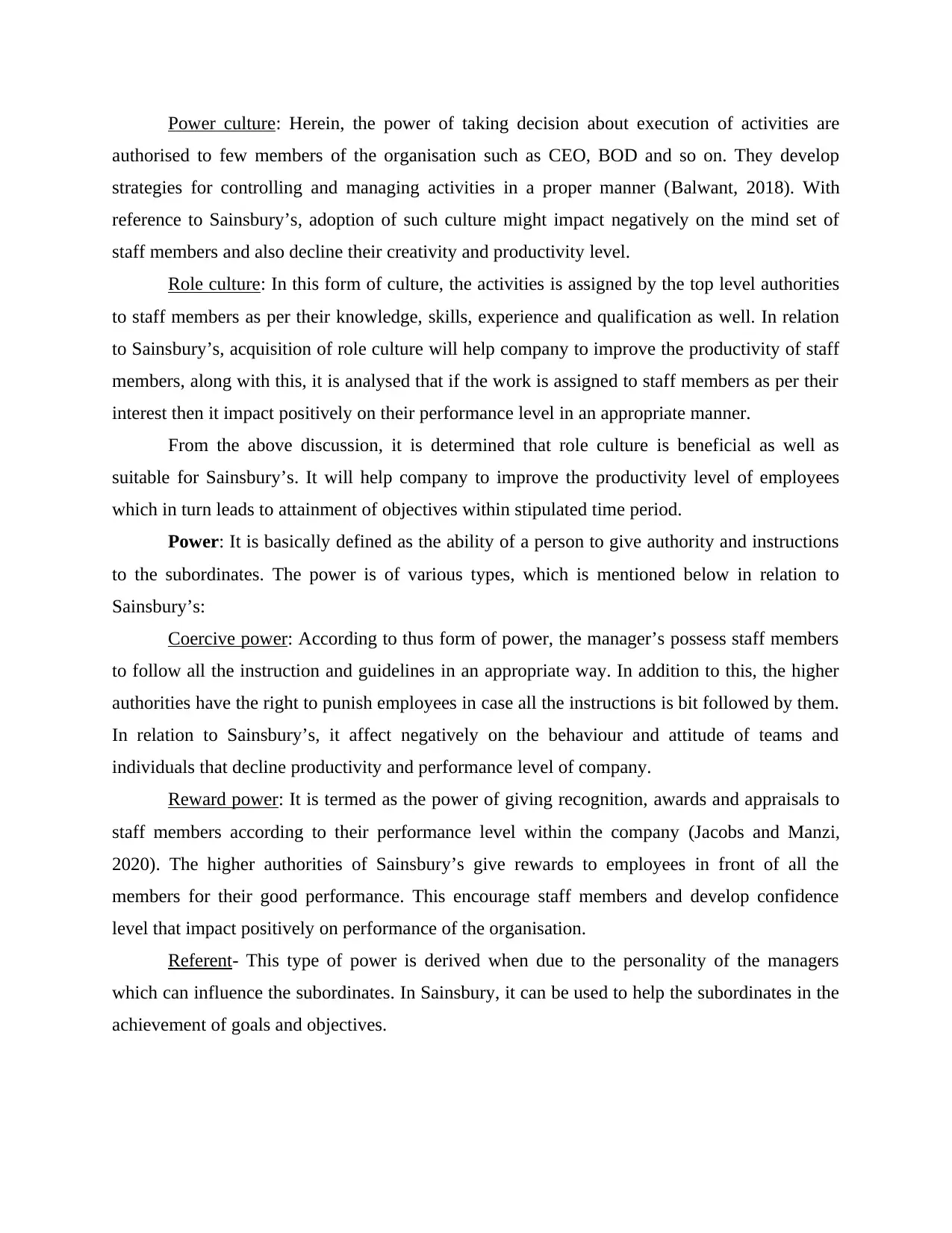
Power culture: Herein, the power of taking decision about execution of activities are
authorised to few members of the organisation such as CEO, BOD and so on. They develop
strategies for controlling and managing activities in a proper manner (Balwant, 2018). With
reference to Sainsbury’s, adoption of such culture might impact negatively on the mind set of
staff members and also decline their creativity and productivity level.
Role culture: In this form of culture, the activities is assigned by the top level authorities
to staff members as per their knowledge, skills, experience and qualification as well. In relation
to Sainsbury’s, acquisition of role culture will help company to improve the productivity of staff
members, along with this, it is analysed that if the work is assigned to staff members as per their
interest then it impact positively on their performance level in an appropriate manner.
From the above discussion, it is determined that role culture is beneficial as well as
suitable for Sainsbury’s. It will help company to improve the productivity level of employees
which in turn leads to attainment of objectives within stipulated time period.
Power: It is basically defined as the ability of a person to give authority and instructions
to the subordinates. The power is of various types, which is mentioned below in relation to
Sainsbury’s:
Coercive power: According to thus form of power, the manager’s possess staff members
to follow all the instruction and guidelines in an appropriate way. In addition to this, the higher
authorities have the right to punish employees in case all the instructions is bit followed by them.
In relation to Sainsbury’s, it affect negatively on the behaviour and attitude of teams and
individuals that decline productivity and performance level of company.
Reward power: It is termed as the power of giving recognition, awards and appraisals to
staff members according to their performance level within the company (Jacobs and Manzi,
2020). The higher authorities of Sainsbury’s give rewards to employees in front of all the
members for their good performance. This encourage staff members and develop confidence
level that impact positively on performance of the organisation.
Referent- This type of power is derived when due to the personality of the managers
which can influence the subordinates. In Sainsbury, it can be used to help the subordinates in the
achievement of goals and objectives.
authorised to few members of the organisation such as CEO, BOD and so on. They develop
strategies for controlling and managing activities in a proper manner (Balwant, 2018). With
reference to Sainsbury’s, adoption of such culture might impact negatively on the mind set of
staff members and also decline their creativity and productivity level.
Role culture: In this form of culture, the activities is assigned by the top level authorities
to staff members as per their knowledge, skills, experience and qualification as well. In relation
to Sainsbury’s, acquisition of role culture will help company to improve the productivity of staff
members, along with this, it is analysed that if the work is assigned to staff members as per their
interest then it impact positively on their performance level in an appropriate manner.
From the above discussion, it is determined that role culture is beneficial as well as
suitable for Sainsbury’s. It will help company to improve the productivity level of employees
which in turn leads to attainment of objectives within stipulated time period.
Power: It is basically defined as the ability of a person to give authority and instructions
to the subordinates. The power is of various types, which is mentioned below in relation to
Sainsbury’s:
Coercive power: According to thus form of power, the manager’s possess staff members
to follow all the instruction and guidelines in an appropriate way. In addition to this, the higher
authorities have the right to punish employees in case all the instructions is bit followed by them.
In relation to Sainsbury’s, it affect negatively on the behaviour and attitude of teams and
individuals that decline productivity and performance level of company.
Reward power: It is termed as the power of giving recognition, awards and appraisals to
staff members according to their performance level within the company (Jacobs and Manzi,
2020). The higher authorities of Sainsbury’s give rewards to employees in front of all the
members for their good performance. This encourage staff members and develop confidence
level that impact positively on performance of the organisation.
Referent- This type of power is derived when due to the personality of the managers
which can influence the subordinates. In Sainsbury, it can be used to help the subordinates in the
achievement of goals and objectives.
Paraphrase This Document
Need a fresh take? Get an instant paraphrase of this document with our AI Paraphraser
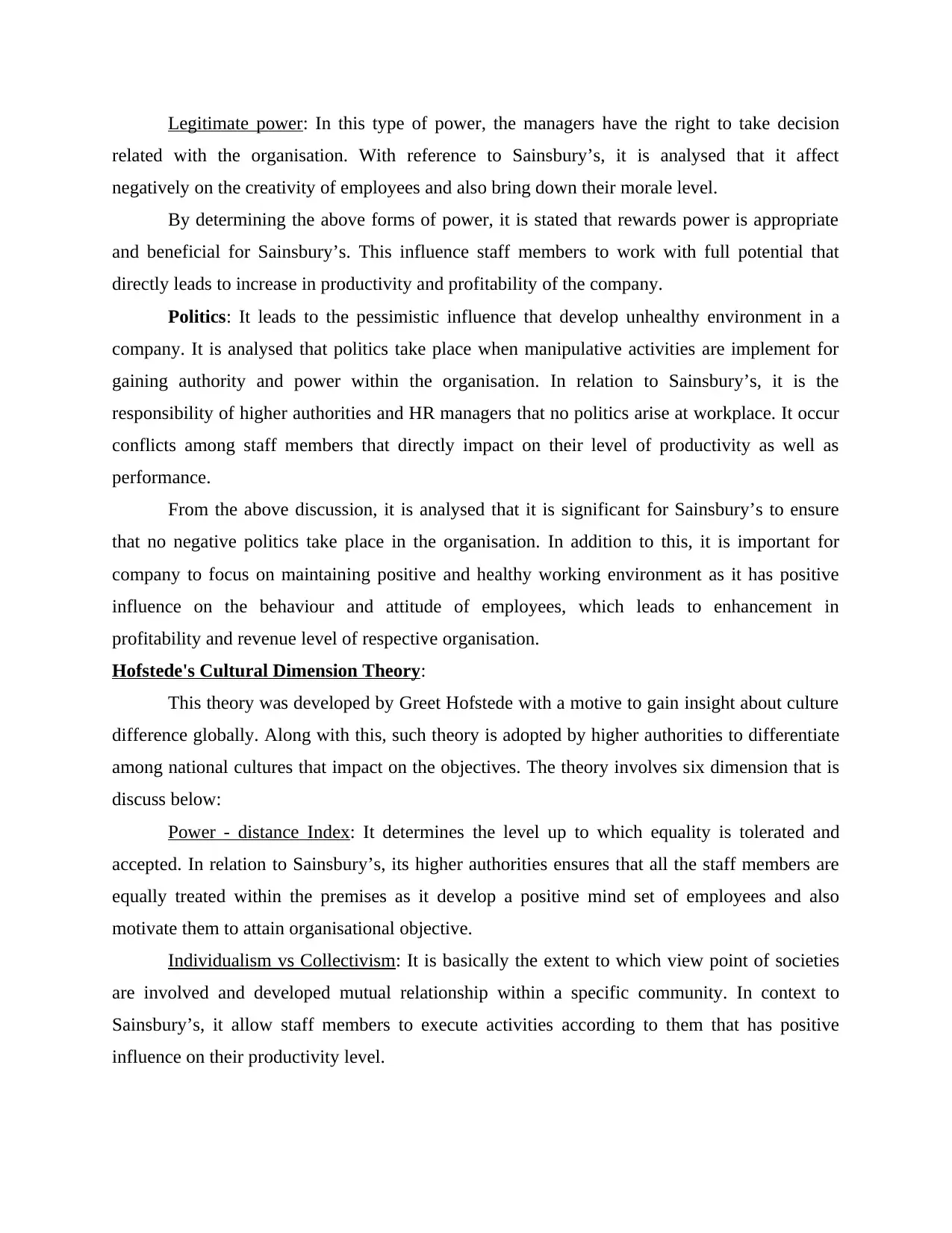
Legitimate power: In this type of power, the managers have the right to take decision
related with the organisation. With reference to Sainsbury’s, it is analysed that it affect
negatively on the creativity of employees and also bring down their morale level.
By determining the above forms of power, it is stated that rewards power is appropriate
and beneficial for Sainsbury’s. This influence staff members to work with full potential that
directly leads to increase in productivity and profitability of the company.
Politics: It leads to the pessimistic influence that develop unhealthy environment in a
company. It is analysed that politics take place when manipulative activities are implement for
gaining authority and power within the organisation. In relation to Sainsbury’s, it is the
responsibility of higher authorities and HR managers that no politics arise at workplace. It occur
conflicts among staff members that directly impact on their level of productivity as well as
performance.
From the above discussion, it is analysed that it is significant for Sainsbury’s to ensure
that no negative politics take place in the organisation. In addition to this, it is important for
company to focus on maintaining positive and healthy working environment as it has positive
influence on the behaviour and attitude of employees, which leads to enhancement in
profitability and revenue level of respective organisation.
Hofstede's Cultural Dimension Theory:
This theory was developed by Greet Hofstede with a motive to gain insight about culture
difference globally. Along with this, such theory is adopted by higher authorities to differentiate
among national cultures that impact on the objectives. The theory involves six dimension that is
discuss below:
Power - distance Index: It determines the level up to which equality is tolerated and
accepted. In relation to Sainsbury’s, its higher authorities ensures that all the staff members are
equally treated within the premises as it develop a positive mind set of employees and also
motivate them to attain organisational objective.
Individualism vs Collectivism: It is basically the extent to which view point of societies
are involved and developed mutual relationship within a specific community. In context to
Sainsbury’s, it allow staff members to execute activities according to them that has positive
influence on their productivity level.
related with the organisation. With reference to Sainsbury’s, it is analysed that it affect
negatively on the creativity of employees and also bring down their morale level.
By determining the above forms of power, it is stated that rewards power is appropriate
and beneficial for Sainsbury’s. This influence staff members to work with full potential that
directly leads to increase in productivity and profitability of the company.
Politics: It leads to the pessimistic influence that develop unhealthy environment in a
company. It is analysed that politics take place when manipulative activities are implement for
gaining authority and power within the organisation. In relation to Sainsbury’s, it is the
responsibility of higher authorities and HR managers that no politics arise at workplace. It occur
conflicts among staff members that directly impact on their level of productivity as well as
performance.
From the above discussion, it is analysed that it is significant for Sainsbury’s to ensure
that no negative politics take place in the organisation. In addition to this, it is important for
company to focus on maintaining positive and healthy working environment as it has positive
influence on the behaviour and attitude of employees, which leads to enhancement in
profitability and revenue level of respective organisation.
Hofstede's Cultural Dimension Theory:
This theory was developed by Greet Hofstede with a motive to gain insight about culture
difference globally. Along with this, such theory is adopted by higher authorities to differentiate
among national cultures that impact on the objectives. The theory involves six dimension that is
discuss below:
Power - distance Index: It determines the level up to which equality is tolerated and
accepted. In relation to Sainsbury’s, its higher authorities ensures that all the staff members are
equally treated within the premises as it develop a positive mind set of employees and also
motivate them to attain organisational objective.
Individualism vs Collectivism: It is basically the extent to which view point of societies
are involved and developed mutual relationship within a specific community. In context to
Sainsbury’s, it allow staff members to execute activities according to them that has positive
influence on their productivity level.
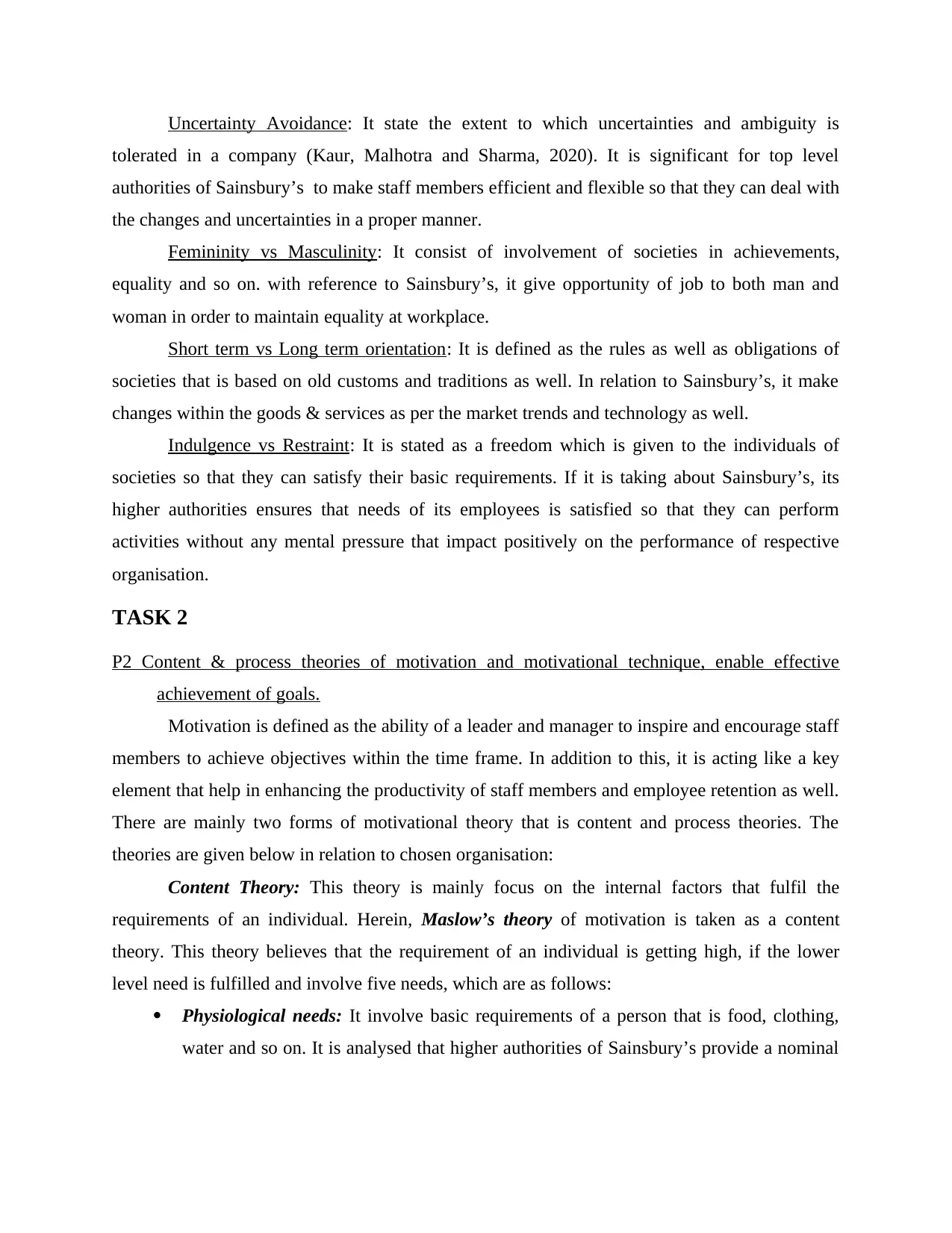
Uncertainty Avoidance: It state the extent to which uncertainties and ambiguity is
tolerated in a company (Kaur, Malhotra and Sharma, 2020). It is significant for top level
authorities of Sainsbury’s to make staff members efficient and flexible so that they can deal with
the changes and uncertainties in a proper manner.
Femininity vs Masculinity: It consist of involvement of societies in achievements,
equality and so on. with reference to Sainsbury’s, it give opportunity of job to both man and
woman in order to maintain equality at workplace.
Short term vs Long term orientation: It is defined as the rules as well as obligations of
societies that is based on old customs and traditions as well. In relation to Sainsbury’s, it make
changes within the goods & services as per the market trends and technology as well.
Indulgence vs Restraint: It is stated as a freedom which is given to the individuals of
societies so that they can satisfy their basic requirements. If it is taking about Sainsbury’s, its
higher authorities ensures that needs of its employees is satisfied so that they can perform
activities without any mental pressure that impact positively on the performance of respective
organisation.
TASK 2
P2 Content & process theories of motivation and motivational technique, enable effective
achievement of goals.
Motivation is defined as the ability of a leader and manager to inspire and encourage staff
members to achieve objectives within the time frame. In addition to this, it is acting like a key
element that help in enhancing the productivity of staff members and employee retention as well.
There are mainly two forms of motivational theory that is content and process theories. The
theories are given below in relation to chosen organisation:
Content Theory: This theory is mainly focus on the internal factors that fulfil the
requirements of an individual. Herein, Maslow’s theory of motivation is taken as a content
theory. This theory believes that the requirement of an individual is getting high, if the lower
level need is fulfilled and involve five needs, which are as follows:
Physiological needs: It involve basic requirements of a person that is food, clothing,
water and so on. It is analysed that higher authorities of Sainsbury’s provide a nominal
tolerated in a company (Kaur, Malhotra and Sharma, 2020). It is significant for top level
authorities of Sainsbury’s to make staff members efficient and flexible so that they can deal with
the changes and uncertainties in a proper manner.
Femininity vs Masculinity: It consist of involvement of societies in achievements,
equality and so on. with reference to Sainsbury’s, it give opportunity of job to both man and
woman in order to maintain equality at workplace.
Short term vs Long term orientation: It is defined as the rules as well as obligations of
societies that is based on old customs and traditions as well. In relation to Sainsbury’s, it make
changes within the goods & services as per the market trends and technology as well.
Indulgence vs Restraint: It is stated as a freedom which is given to the individuals of
societies so that they can satisfy their basic requirements. If it is taking about Sainsbury’s, its
higher authorities ensures that needs of its employees is satisfied so that they can perform
activities without any mental pressure that impact positively on the performance of respective
organisation.
TASK 2
P2 Content & process theories of motivation and motivational technique, enable effective
achievement of goals.
Motivation is defined as the ability of a leader and manager to inspire and encourage staff
members to achieve objectives within the time frame. In addition to this, it is acting like a key
element that help in enhancing the productivity of staff members and employee retention as well.
There are mainly two forms of motivational theory that is content and process theories. The
theories are given below in relation to chosen organisation:
Content Theory: This theory is mainly focus on the internal factors that fulfil the
requirements of an individual. Herein, Maslow’s theory of motivation is taken as a content
theory. This theory believes that the requirement of an individual is getting high, if the lower
level need is fulfilled and involve five needs, which are as follows:
Physiological needs: It involve basic requirements of a person that is food, clothing,
water and so on. It is analysed that higher authorities of Sainsbury’s provide a nominal
⊘ This is a preview!⊘
Do you want full access?
Subscribe today to unlock all pages.

Trusted by 1+ million students worldwide
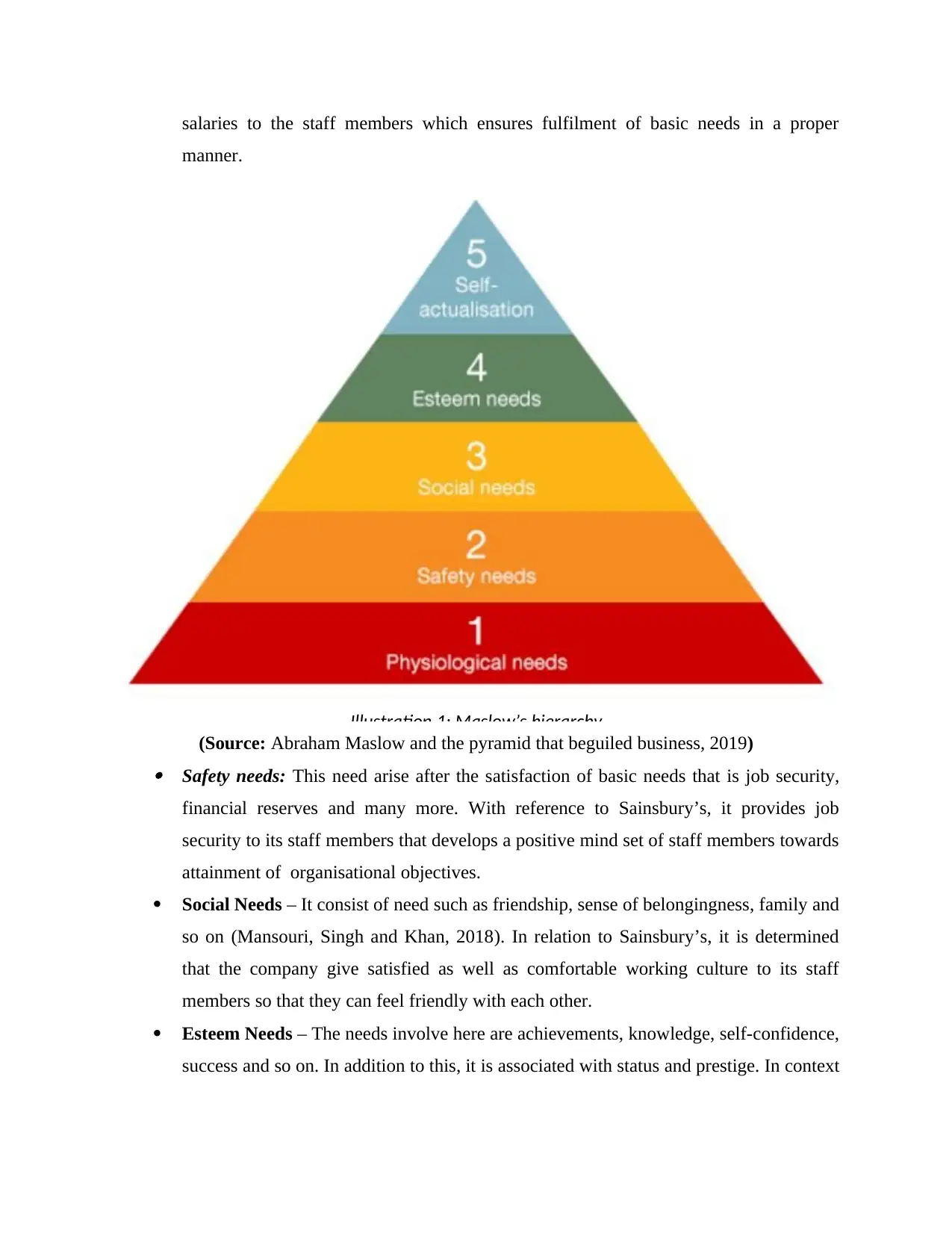
salaries to the staff members which ensures fulfilment of basic needs in a proper
manner.
(Source: Abraham Maslow and the pyramid that beguiled business, 2019) Safety needs: This need arise after the satisfaction of basic needs that is job security,
financial reserves and many more. With reference to Sainsbury’s, it provides job
security to its staff members that develops a positive mind set of staff members towards
attainment of organisational objectives.
Social Needs – It consist of need such as friendship, sense of belongingness, family and
so on (Mansouri, Singh and Khan, 2018). In relation to Sainsbury’s, it is determined
that the company give satisfied as well as comfortable working culture to its staff
members so that they can feel friendly with each other.
Esteem Needs – The needs involve here are achievements, knowledge, self-confidence,
success and so on. In addition to this, it is associated with status and prestige. In context
Illustration 1: Maslow’s hierarchy
manner.
(Source: Abraham Maslow and the pyramid that beguiled business, 2019) Safety needs: This need arise after the satisfaction of basic needs that is job security,
financial reserves and many more. With reference to Sainsbury’s, it provides job
security to its staff members that develops a positive mind set of staff members towards
attainment of organisational objectives.
Social Needs – It consist of need such as friendship, sense of belongingness, family and
so on (Mansouri, Singh and Khan, 2018). In relation to Sainsbury’s, it is determined
that the company give satisfied as well as comfortable working culture to its staff
members so that they can feel friendly with each other.
Esteem Needs – The needs involve here are achievements, knowledge, self-confidence,
success and so on. In addition to this, it is associated with status and prestige. In context
Illustration 1: Maslow’s hierarchy
Paraphrase This Document
Need a fresh take? Get an instant paraphrase of this document with our AI Paraphraser
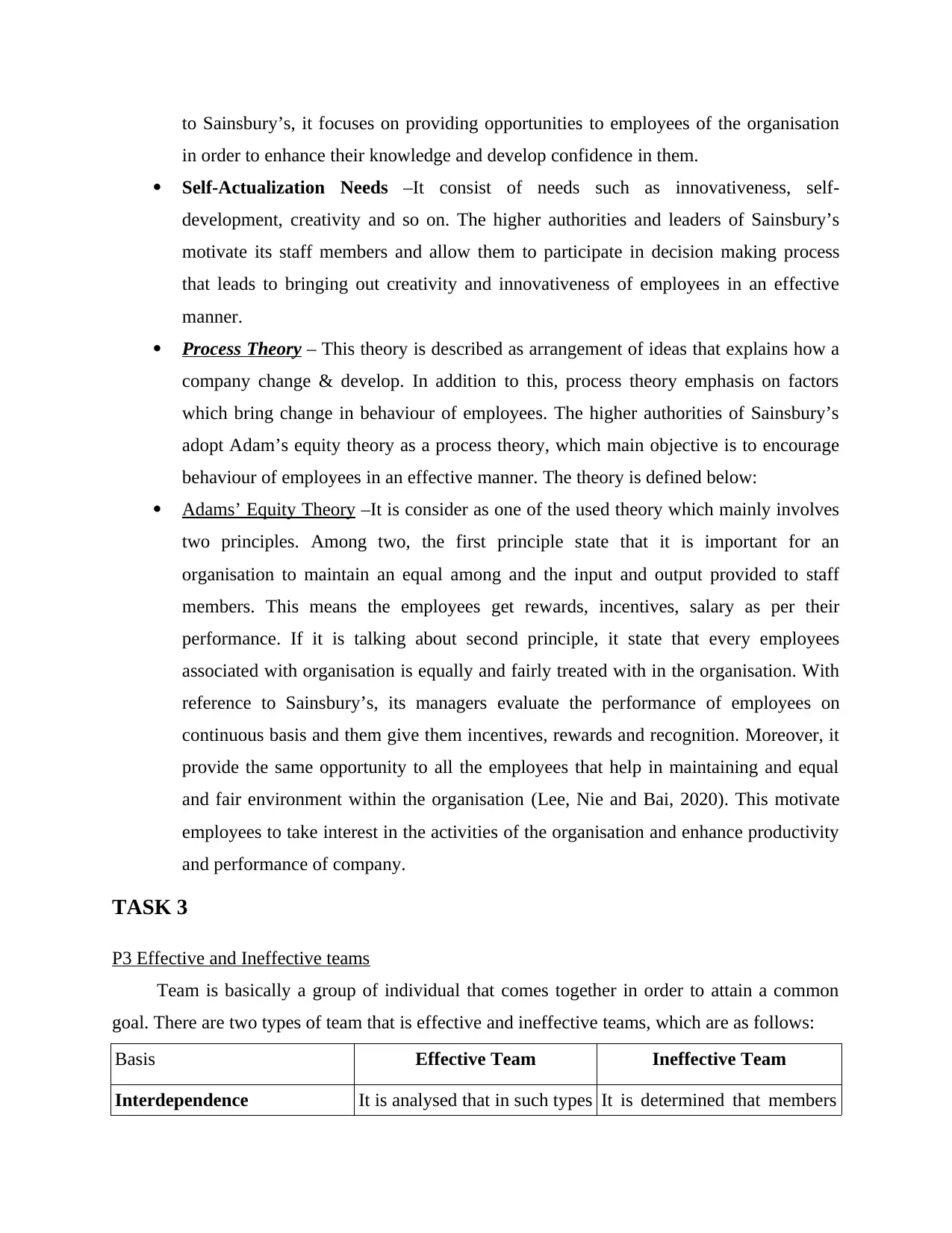
to Sainsbury’s, it focuses on providing opportunities to employees of the organisation
in order to enhance their knowledge and develop confidence in them.
Self-Actualization Needs –It consist of needs such as innovativeness, self-
development, creativity and so on. The higher authorities and leaders of Sainsbury’s
motivate its staff members and allow them to participate in decision making process
that leads to bringing out creativity and innovativeness of employees in an effective
manner.
Process Theory – This theory is described as arrangement of ideas that explains how a
company change & develop. In addition to this, process theory emphasis on factors
which bring change in behaviour of employees. The higher authorities of Sainsbury’s
adopt Adam’s equity theory as a process theory, which main objective is to encourage
behaviour of employees in an effective manner. The theory is defined below:
Adams’ Equity Theory –It is consider as one of the used theory which mainly involves
two principles. Among two, the first principle state that it is important for an
organisation to maintain an equal among and the input and output provided to staff
members. This means the employees get rewards, incentives, salary as per their
performance. If it is talking about second principle, it state that every employees
associated with organisation is equally and fairly treated with in the organisation. With
reference to Sainsbury’s, its managers evaluate the performance of employees on
continuous basis and them give them incentives, rewards and recognition. Moreover, it
provide the same opportunity to all the employees that help in maintaining and equal
and fair environment within the organisation (Lee, Nie and Bai, 2020). This motivate
employees to take interest in the activities of the organisation and enhance productivity
and performance of company.
TASK 3
P3 Effective and Ineffective teams
Team is basically a group of individual that comes together in order to attain a common
goal. There are two types of team that is effective and ineffective teams, which are as follows:
Basis Effective Team Ineffective Team
Interdependence It is analysed that in such types It is determined that members
in order to enhance their knowledge and develop confidence in them.
Self-Actualization Needs –It consist of needs such as innovativeness, self-
development, creativity and so on. The higher authorities and leaders of Sainsbury’s
motivate its staff members and allow them to participate in decision making process
that leads to bringing out creativity and innovativeness of employees in an effective
manner.
Process Theory – This theory is described as arrangement of ideas that explains how a
company change & develop. In addition to this, process theory emphasis on factors
which bring change in behaviour of employees. The higher authorities of Sainsbury’s
adopt Adam’s equity theory as a process theory, which main objective is to encourage
behaviour of employees in an effective manner. The theory is defined below:
Adams’ Equity Theory –It is consider as one of the used theory which mainly involves
two principles. Among two, the first principle state that it is important for an
organisation to maintain an equal among and the input and output provided to staff
members. This means the employees get rewards, incentives, salary as per their
performance. If it is talking about second principle, it state that every employees
associated with organisation is equally and fairly treated with in the organisation. With
reference to Sainsbury’s, its managers evaluate the performance of employees on
continuous basis and them give them incentives, rewards and recognition. Moreover, it
provide the same opportunity to all the employees that help in maintaining and equal
and fair environment within the organisation (Lee, Nie and Bai, 2020). This motivate
employees to take interest in the activities of the organisation and enhance productivity
and performance of company.
TASK 3
P3 Effective and Ineffective teams
Team is basically a group of individual that comes together in order to attain a common
goal. There are two types of team that is effective and ineffective teams, which are as follows:
Basis Effective Team Ineffective Team
Interdependence It is analysed that in such types It is determined that members
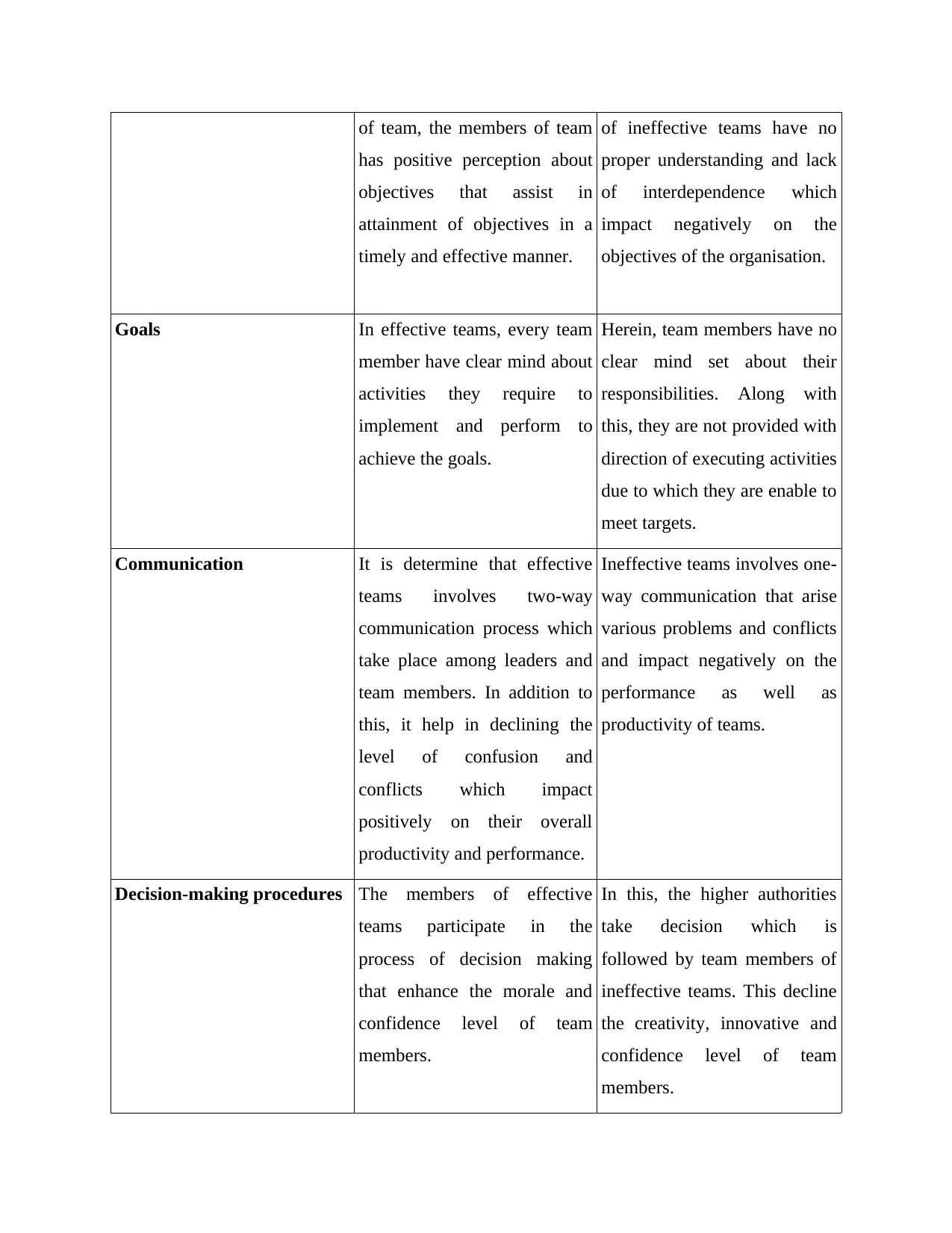
of team, the members of team
has positive perception about
objectives that assist in
attainment of objectives in a
timely and effective manner.
of ineffective teams have no
proper understanding and lack
of interdependence which
impact negatively on the
objectives of the organisation.
Goals In effective teams, every team
member have clear mind about
activities they require to
implement and perform to
achieve the goals.
Herein, team members have no
clear mind set about their
responsibilities. Along with
this, they are not provided with
direction of executing activities
due to which they are enable to
meet targets.
Communication It is determine that effective
teams involves two-way
communication process which
take place among leaders and
team members. In addition to
this, it help in declining the
level of confusion and
conflicts which impact
positively on their overall
productivity and performance.
Ineffective teams involves one-
way communication that arise
various problems and conflicts
and impact negatively on the
performance as well as
productivity of teams.
Decision-making procedures The members of effective
teams participate in the
process of decision making
that enhance the morale and
confidence level of team
members.
In this, the higher authorities
take decision which is
followed by team members of
ineffective teams. This decline
the creativity, innovative and
confidence level of team
members.
has positive perception about
objectives that assist in
attainment of objectives in a
timely and effective manner.
of ineffective teams have no
proper understanding and lack
of interdependence which
impact negatively on the
objectives of the organisation.
Goals In effective teams, every team
member have clear mind about
activities they require to
implement and perform to
achieve the goals.
Herein, team members have no
clear mind set about their
responsibilities. Along with
this, they are not provided with
direction of executing activities
due to which they are enable to
meet targets.
Communication It is determine that effective
teams involves two-way
communication process which
take place among leaders and
team members. In addition to
this, it help in declining the
level of confusion and
conflicts which impact
positively on their overall
productivity and performance.
Ineffective teams involves one-
way communication that arise
various problems and conflicts
and impact negatively on the
performance as well as
productivity of teams.
Decision-making procedures The members of effective
teams participate in the
process of decision making
that enhance the morale and
confidence level of team
members.
In this, the higher authorities
take decision which is
followed by team members of
ineffective teams. This decline
the creativity, innovative and
confidence level of team
members.
⊘ This is a preview!⊘
Do you want full access?
Subscribe today to unlock all pages.

Trusted by 1+ million students worldwide
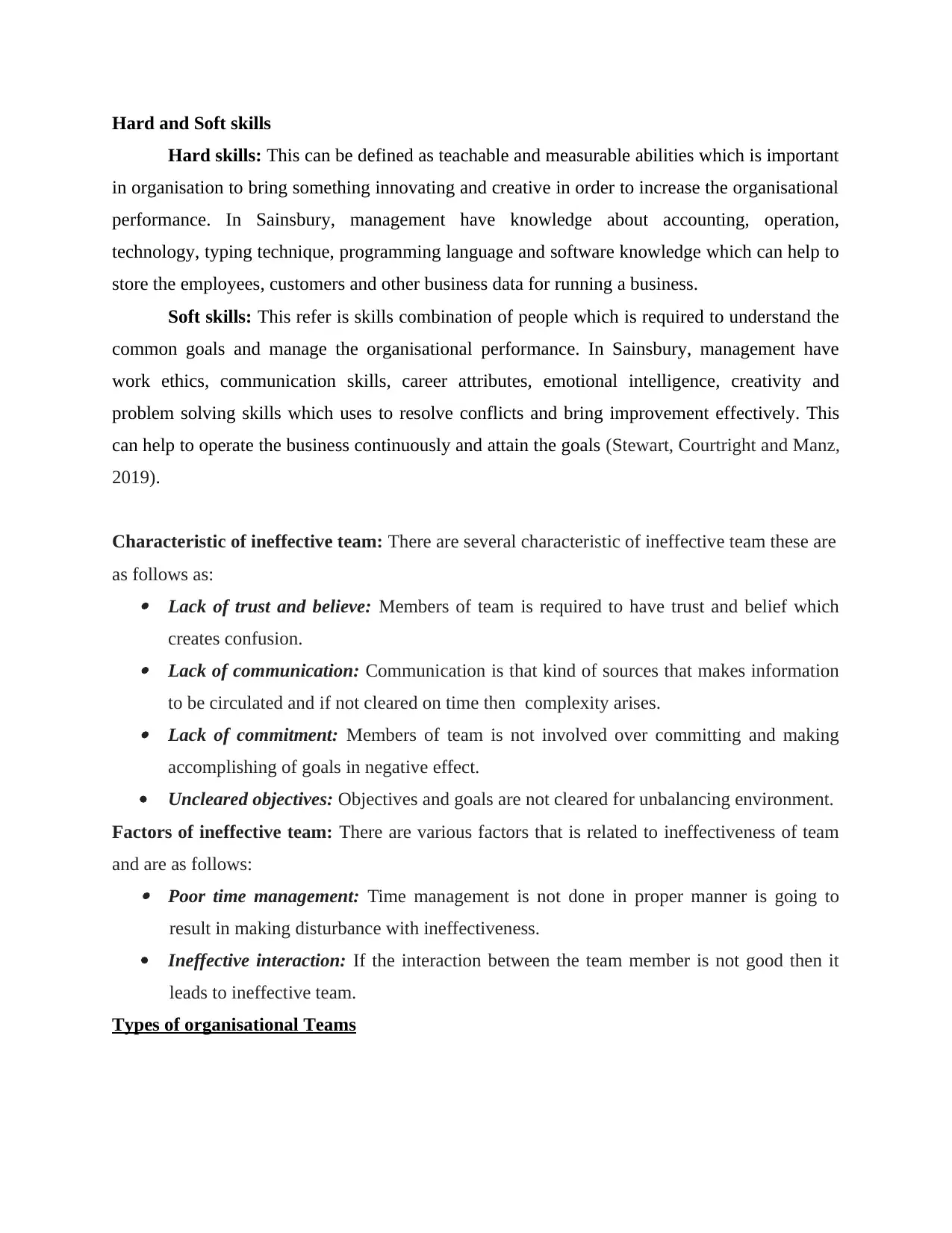
Hard and Soft skills
Hard skills: This can be defined as teachable and measurable abilities which is important
in organisation to bring something innovating and creative in order to increase the organisational
performance. In Sainsbury, management have knowledge about accounting, operation,
technology, typing technique, programming language and software knowledge which can help to
store the employees, customers and other business data for running a business.
Soft skills: This refer is skills combination of people which is required to understand the
common goals and manage the organisational performance. In Sainsbury, management have
work ethics, communication skills, career attributes, emotional intelligence, creativity and
problem solving skills which uses to resolve conflicts and bring improvement effectively. This
can help to operate the business continuously and attain the goals (Stewart, Courtright and Manz,
2019).
Characteristic of ineffective team: There are several characteristic of ineffective team these are
as follows as: Lack of trust and believe: Members of team is required to have trust and belief which
creates confusion. Lack of communication: Communication is that kind of sources that makes information
to be circulated and if not cleared on time then complexity arises. Lack of commitment: Members of team is not involved over committing and making
accomplishing of goals in negative effect.
Uncleared objectives: Objectives and goals are not cleared for unbalancing environment.
Factors of ineffective team: There are various factors that is related to ineffectiveness of team
and are as follows: Poor time management: Time management is not done in proper manner is going to
result in making disturbance with ineffectiveness.
Ineffective interaction: If the interaction between the team member is not good then it
leads to ineffective team.
Types of organisational Teams
Hard skills: This can be defined as teachable and measurable abilities which is important
in organisation to bring something innovating and creative in order to increase the organisational
performance. In Sainsbury, management have knowledge about accounting, operation,
technology, typing technique, programming language and software knowledge which can help to
store the employees, customers and other business data for running a business.
Soft skills: This refer is skills combination of people which is required to understand the
common goals and manage the organisational performance. In Sainsbury, management have
work ethics, communication skills, career attributes, emotional intelligence, creativity and
problem solving skills which uses to resolve conflicts and bring improvement effectively. This
can help to operate the business continuously and attain the goals (Stewart, Courtright and Manz,
2019).
Characteristic of ineffective team: There are several characteristic of ineffective team these are
as follows as: Lack of trust and believe: Members of team is required to have trust and belief which
creates confusion. Lack of communication: Communication is that kind of sources that makes information
to be circulated and if not cleared on time then complexity arises. Lack of commitment: Members of team is not involved over committing and making
accomplishing of goals in negative effect.
Uncleared objectives: Objectives and goals are not cleared for unbalancing environment.
Factors of ineffective team: There are various factors that is related to ineffectiveness of team
and are as follows: Poor time management: Time management is not done in proper manner is going to
result in making disturbance with ineffectiveness.
Ineffective interaction: If the interaction between the team member is not good then it
leads to ineffective team.
Types of organisational Teams
Paraphrase This Document
Need a fresh take? Get an instant paraphrase of this document with our AI Paraphraser
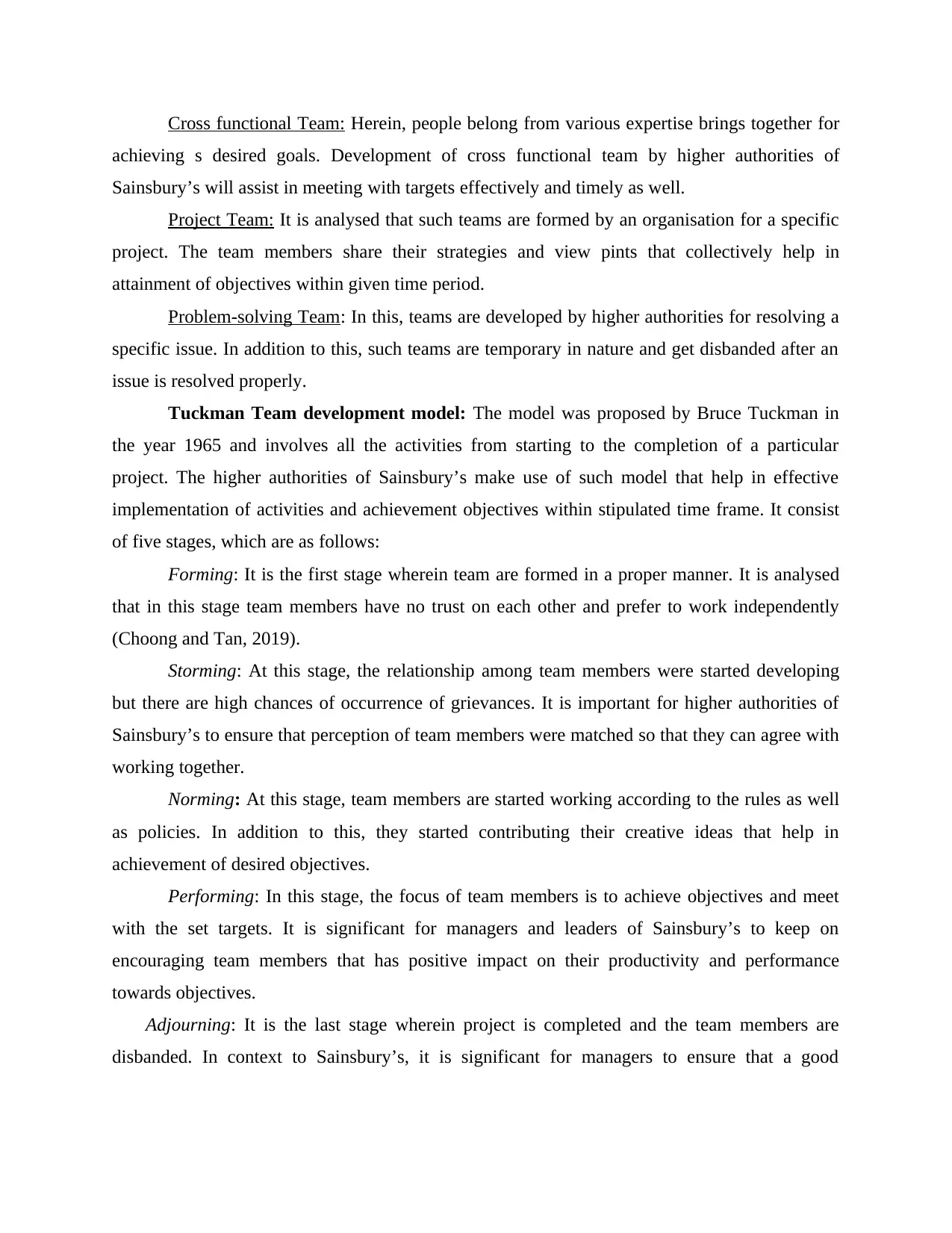
Cross functional Team: Herein, people belong from various expertise brings together for
achieving s desired goals. Development of cross functional team by higher authorities of
Sainsbury’s will assist in meeting with targets effectively and timely as well.
Project Team: It is analysed that such teams are formed by an organisation for a specific
project. The team members share their strategies and view pints that collectively help in
attainment of objectives within given time period.
Problem-solving Team: In this, teams are developed by higher authorities for resolving a
specific issue. In addition to this, such teams are temporary in nature and get disbanded after an
issue is resolved properly.
Tuckman Team development model: The model was proposed by Bruce Tuckman in
the year 1965 and involves all the activities from starting to the completion of a particular
project. The higher authorities of Sainsbury’s make use of such model that help in effective
implementation of activities and achievement objectives within stipulated time frame. It consist
of five stages, which are as follows:
Forming: It is the first stage wherein team are formed in a proper manner. It is analysed
that in this stage team members have no trust on each other and prefer to work independently
(Choong and Tan, 2019).
Storming: At this stage, the relationship among team members were started developing
but there are high chances of occurrence of grievances. It is important for higher authorities of
Sainsbury’s to ensure that perception of team members were matched so that they can agree with
working together.
Norming: At this stage, team members are started working according to the rules as well
as policies. In addition to this, they started contributing their creative ideas that help in
achievement of desired objectives.
Performing: In this stage, the focus of team members is to achieve objectives and meet
with the set targets. It is significant for managers and leaders of Sainsbury’s to keep on
encouraging team members that has positive impact on their productivity and performance
towards objectives.
Adjourning: It is the last stage wherein project is completed and the team members are
disbanded. In context to Sainsbury’s, it is significant for managers to ensure that a good
achieving s desired goals. Development of cross functional team by higher authorities of
Sainsbury’s will assist in meeting with targets effectively and timely as well.
Project Team: It is analysed that such teams are formed by an organisation for a specific
project. The team members share their strategies and view pints that collectively help in
attainment of objectives within given time period.
Problem-solving Team: In this, teams are developed by higher authorities for resolving a
specific issue. In addition to this, such teams are temporary in nature and get disbanded after an
issue is resolved properly.
Tuckman Team development model: The model was proposed by Bruce Tuckman in
the year 1965 and involves all the activities from starting to the completion of a particular
project. The higher authorities of Sainsbury’s make use of such model that help in effective
implementation of activities and achievement objectives within stipulated time frame. It consist
of five stages, which are as follows:
Forming: It is the first stage wherein team are formed in a proper manner. It is analysed
that in this stage team members have no trust on each other and prefer to work independently
(Choong and Tan, 2019).
Storming: At this stage, the relationship among team members were started developing
but there are high chances of occurrence of grievances. It is important for higher authorities of
Sainsbury’s to ensure that perception of team members were matched so that they can agree with
working together.
Norming: At this stage, team members are started working according to the rules as well
as policies. In addition to this, they started contributing their creative ideas that help in
achievement of desired objectives.
Performing: In this stage, the focus of team members is to achieve objectives and meet
with the set targets. It is significant for managers and leaders of Sainsbury’s to keep on
encouraging team members that has positive impact on their productivity and performance
towards objectives.
Adjourning: It is the last stage wherein project is completed and the team members are
disbanded. In context to Sainsbury’s, it is significant for managers to ensure that a good
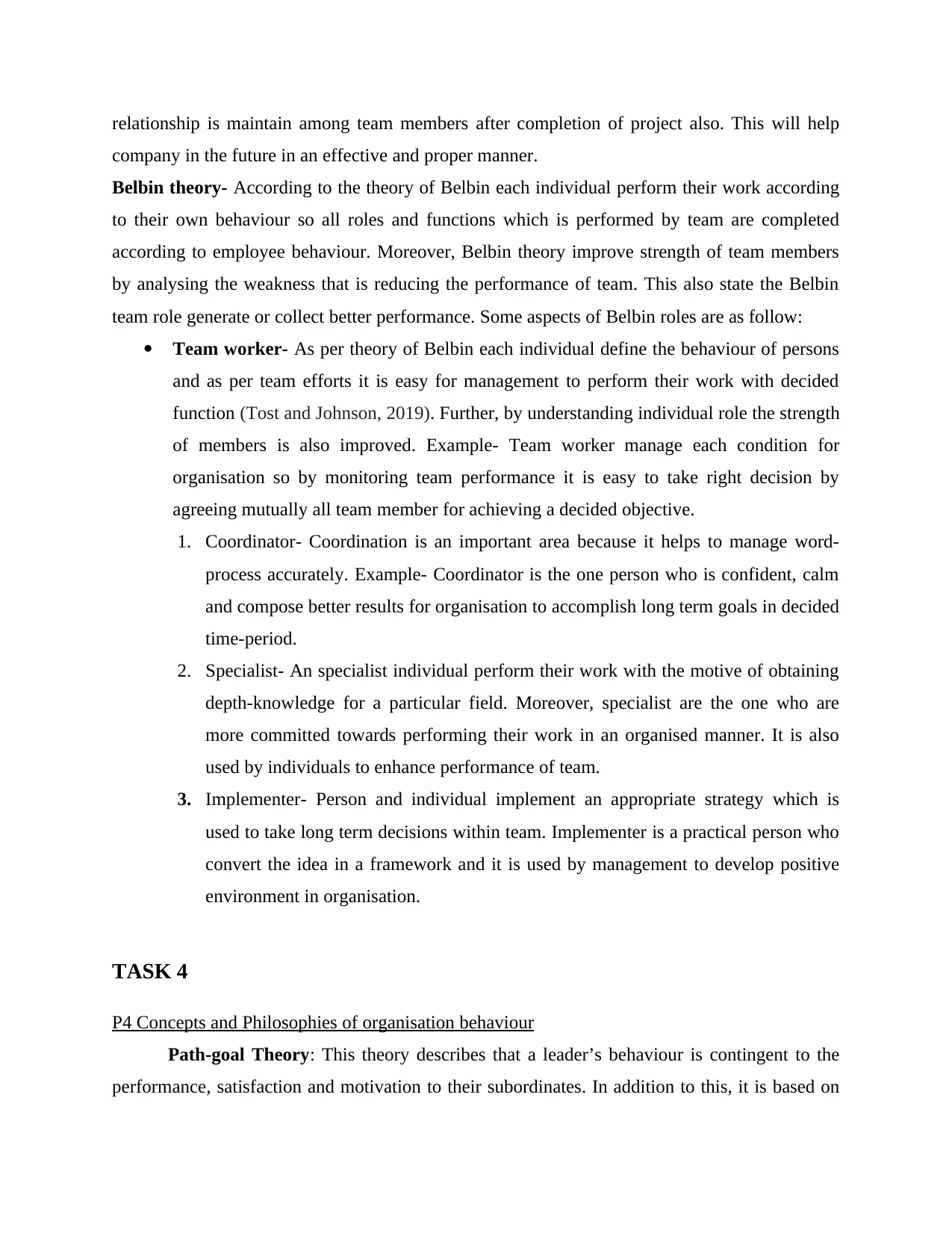
relationship is maintain among team members after completion of project also. This will help
company in the future in an effective and proper manner.
Belbin theory- According to the theory of Belbin each individual perform their work according
to their own behaviour so all roles and functions which is performed by team are completed
according to employee behaviour. Moreover, Belbin theory improve strength of team members
by analysing the weakness that is reducing the performance of team. This also state the Belbin
team role generate or collect better performance. Some aspects of Belbin roles are as follow:
Team worker- As per theory of Belbin each individual define the behaviour of persons
and as per team efforts it is easy for management to perform their work with decided
function (Tost and Johnson, 2019). Further, by understanding individual role the strength
of members is also improved. Example- Team worker manage each condition for
organisation so by monitoring team performance it is easy to take right decision by
agreeing mutually all team member for achieving a decided objective.
1. Coordinator- Coordination is an important area because it helps to manage word-
process accurately. Example- Coordinator is the one person who is confident, calm
and compose better results for organisation to accomplish long term goals in decided
time-period.
2. Specialist- An specialist individual perform their work with the motive of obtaining
depth-knowledge for a particular field. Moreover, specialist are the one who are
more committed towards performing their work in an organised manner. It is also
used by individuals to enhance performance of team.
3. Implementer- Person and individual implement an appropriate strategy which is
used to take long term decisions within team. Implementer is a practical person who
convert the idea in a framework and it is used by management to develop positive
environment in organisation.
TASK 4
P4 Concepts and Philosophies of organisation behaviour
Path-goal Theory: This theory describes that a leader’s behaviour is contingent to the
performance, satisfaction and motivation to their subordinates. In addition to this, it is based on
company in the future in an effective and proper manner.
Belbin theory- According to the theory of Belbin each individual perform their work according
to their own behaviour so all roles and functions which is performed by team are completed
according to employee behaviour. Moreover, Belbin theory improve strength of team members
by analysing the weakness that is reducing the performance of team. This also state the Belbin
team role generate or collect better performance. Some aspects of Belbin roles are as follow:
Team worker- As per theory of Belbin each individual define the behaviour of persons
and as per team efforts it is easy for management to perform their work with decided
function (Tost and Johnson, 2019). Further, by understanding individual role the strength
of members is also improved. Example- Team worker manage each condition for
organisation so by monitoring team performance it is easy to take right decision by
agreeing mutually all team member for achieving a decided objective.
1. Coordinator- Coordination is an important area because it helps to manage word-
process accurately. Example- Coordinator is the one person who is confident, calm
and compose better results for organisation to accomplish long term goals in decided
time-period.
2. Specialist- An specialist individual perform their work with the motive of obtaining
depth-knowledge for a particular field. Moreover, specialist are the one who are
more committed towards performing their work in an organised manner. It is also
used by individuals to enhance performance of team.
3. Implementer- Person and individual implement an appropriate strategy which is
used to take long term decisions within team. Implementer is a practical person who
convert the idea in a framework and it is used by management to develop positive
environment in organisation.
TASK 4
P4 Concepts and Philosophies of organisation behaviour
Path-goal Theory: This theory describes that a leader’s behaviour is contingent to the
performance, satisfaction and motivation to their subordinates. In addition to this, it is based on
⊘ This is a preview!⊘
Do you want full access?
Subscribe today to unlock all pages.

Trusted by 1+ million students worldwide
1 out of 15
Related Documents
Your All-in-One AI-Powered Toolkit for Academic Success.
+13062052269
info@desklib.com
Available 24*7 on WhatsApp / Email
![[object Object]](/_next/static/media/star-bottom.7253800d.svg)
Unlock your academic potential
Copyright © 2020–2026 A2Z Services. All Rights Reserved. Developed and managed by ZUCOL.





